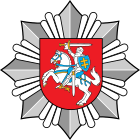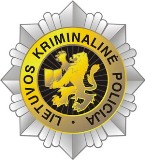Police corruption is a form of police misconduct in which law enforcement officers end up breaking their political contract and abuse their power for personal gain. This type of corruption may involve one or a group of officers. Internal police corruption is a challenge to public trust, cohesion of departmental policies, human rights and legal violations involving serious consequences. Police corruption can take many forms, such as bribery.

The Federal Criminal Police Office of Germany is the federal investigative police agency of Germany, directly subordinated to the Federal Ministry of the Interior. It is headquartered in Wiesbaden, Hesse, and maintains major branch offices in Berlin and Meckenheim near Bonn. It has been headed by Holger Münch since December 2014.

The National Crime Records Bureau, abbreviated to NCRB, is an Indian government agency responsible for collecting and analysing crime data as defined by the Indian Penal Code (IPC) and Special and Local Laws (SLL). NCRB is headquartered in New Delhi and is part of the Ministry of Home Affairs (MHA), Government of India. The current Director of NCRB is Ramphal Pawar (IPS).

The People's Public Security of Vietnam is the main police and security force of Vietnam, under control of the Ministry of Public Security. It is a part of the Vietnam People's Armed Forces and under the de facto control of Communist Party of Vietnam. This force was created on 19 August 1945. It is composed of 2 service branches, the Vietnam People's Security Force and the Vietnam People's Police Force.

Bulgarian law enforcement organisations are mainly subordinate to the Ministry of Interior.

The National Bureau of Investigation (NBI) is a national law enforcement agency of the Finnish Police and the principal criminal investigation and criminal intelligence organization of Finland. The Bureau's main tasks are to counter and investigate organized crime, provide expert services, and develop methods for criminal investigation. NBI is also responsible for financial intelligence (FININT), such as preventing money laundering and terrorism financing. NBI headquarters has been situated in the city of Vantaa within the Capital Region since 1994 with field offices in Tampere, Turku, Mariehamn, Joensuu, Oulu and Rovaniemi. It is subordinate to the National Police Board under the jurisdiction of the Interior Ministry.

The Criminal Police Office, abbreviated .BK, is the federal police force in the Republic of Austria. Its role is to combat crime nationwide and serve as a center for cooperation with international police functions. Created in 2002 under a special law called the Federal Investigation Bureau Law, the .BK is also sometimes referred to as the Austrian Criminal Intelligence Service. It should not be confused with the Federal Criminal Police Office of Germany which is also called the Bundeskriminalamt but abbreviated BKA.

Law enforcement in Finland is the responsibility of several agencies. The Police of Finland, a national police agency, is responsible for most tasks. The two other main agencies are the Finnish Border Guard and the Finnish Customs. Examples of other agencies with limited policing powers are the Finnish Defence Forces, municipal parking inspectors and railway staff.

Law enforcement in Hungary is split among the Police and Border Guards, and the Customs and Excise Authority. Since 2006, the Police has been subject to the Ministry of Justice, when the Ministry of Interior was re-structured to deal with Municipalities and Regional Development. Due to Hungary's accession to the Schengen Treaty, the Police and Border Guards were merged into a single national corps, with the Border Guards becoming Police Officers. This merger took place in January 2008. The Customs and Excise Authority remained to be subject to the Ministry of Finance.
Law enforcement in Azerbaijan comes under the control of the Ministry of Internal Affairs of Azerbaijan, which administers the National Police of the Republic of Azerbaijan. Admitted to the Organization for Security and Co-operation in Europe (OSCE) on 30 January 1992, with an OSCE office opening in Baku on 16 November 1999, and as a member of INTERPOL, the National police force is well integrated into the law enforcement network of European countries.

Law enforcement in Ethiopia is dealt with by the Ethiopian Federal Police at federal level and by regional police commissions in the Regions of Ethiopia. The Ethiopian Federal Police (EFP) was established in 1995 to serve the public, to ensure the observation of human and democratic rights and to maintain the safety and welfare of the public. Its stated duties are the enforcement of laws and safeguarding constitutional guarantees, the prevention, detection and investigation of crime, the coordination of national state police commissions and development of national policing standards. The EFP also has to provide operational support to regional police commissions.
However, local militias also provide local security largely independent of the police and the Ethiopian military. Corruption is a perennial problem, particularly among traffic police who solicited bribes.
The U.S. Department of State states that its contacts within the Ethiopian government report that the findings of investigations into abuses by local security forces, such as arbitrary detentions and beatings of civilians, are rarely made public. However, the Ethiopian government continued its efforts to train police and army recruits in human rights. During 2008 the government is seeking assistance from the International Committee of the Red Cross, the local non-governmental organization Prison Fellowship Ethiopia (JFA-PFE), and the Ethiopian Human Rights Commission to improve and professionalize its human rights training and curriculum. The JFA-PFE provided human rights training for police commissioners and members of the militia in 2008.
Law enforcement in Albania is the responsibility of several agencies. The responsibility for most tasks lies with the Albanian State Police, a national police agency, which is under the authority of Ministry of Internal Affairs. Examples of other agencies with limited policing powers are the Municipal Police, which has administrative functions and operates in the local level. They are controlled by mayors.
The counter-terrorism page primarily deals with special police or military organizations that carry out arrest or direct combat with terrorists. This page deals with the other aspects of counter-terrorism:

In many countries, particularly those with a federal system of government, there may be several law enforcement agencies, police or police-like organizations, each serving different levels of government and enforcing different subsets of the applicable law.
Lithuania is a source, transit, and destination country for women and children trafficked for the purpose of commercial sexual exploitation. Approximately 21 percent of Lithuanian trafficking victims are underage girls. Lithuanian women were trafficked within the country and to the United Kingdom, Germany, Spain, Italy, Portugal, Denmark, Norway, and the Netherlands. Women from Belarus, Russia, and Ukraine are trafficked to and through Lithuania for the purpose of sexual exploitation.
Ministry for Internal Affairs of Chechnya is the official name of Chechnya's police. The Ministry is subordinated directly to the Russian Interior Ministry and the President of Chechnya.
The Garda National Economic Crime Bureau – informally known as the Fraud Squad – is a specialised division of Ireland's national police force, the Garda Síochána, that investigates economic crimes. The Bureau operates as part of the Garda Special Crime Operations branch, and works alongside other sections of the force, as well as the external Office of the Director of Corporate Enforcement (ODCE), an agency tasked with investigating white-collar crime. The Economic Crime Bureau is responsible for the investigation of serious financial fraud and corruption. It was established in April 1996 and is based at Harcourt Square, Dublin 2. The GNECB is headed by an officer of Detective Chief Superintendent rank, who reports to the Assistant Commissioner of Special Crime Operations.














